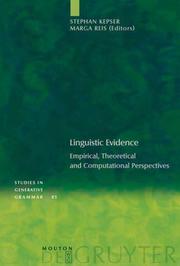| Listing 1 - 8 of 8 |
Sort by
|
Book
ISBN: 3031021509 Year: 2013 Publisher: Cham : Springer International Publishing : Imprint: Springer,
Abstract | Keywords | Export | Availability | Bookmark
 Loading...
Loading...Choose an application
- Reference Manager
- EndNote
- RefWorks (Direct export to RefWorks)
Many NLP tasks have at their core a subtask of extracting the dependencies—who did what to whom—from natural language sentences. This task can be understood as the inverse of the problem solved in different ways by diverse human languages, namely, how to indicate the relationship between different parts of a sentence. Understanding how languages solve the problem can be extremely useful in both feature design and error analysis in the application of machine learning to NLP. Likewise, understanding cross-linguistic variation can be important for the design of MT systems and other multilingual applications. The purpose of this book is to present in a succinct and accessible fashion information about the morphological and syntactic structure of human languages that can be useful in creating more linguistically sophisticated, more language-independent, and thus more successful NLP systems. Table of Contents: Acknowledgments / Introduction/motivation / Morphology: Introduction / Morphophonology / Morphosyntax / Syntax: Introduction / Parts of speech / Heads, arguments, and adjuncts / Argument types and grammatical functions / Mismatches between syntactic position and semantic roles / Resources / Bibliography / Author's Biography / General Index / Index of Languages.
Book
ISBN: 9781627050111 9781627050128 9781681730738 9781681730745 9781681736228 9781681736211 Year: 2020 Publisher: [San Rafael, California] Morgan & Claypool
Abstract | Keywords | Export | Availability | Bookmark
 Loading...
Loading...Choose an application
- Reference Manager
- EndNote
- RefWorks (Direct export to RefWorks)
Lexicology. Semantics --- Grammar --- Pragmatics
Book
ISBN: 303102172X 3031001834 3031010442 Year: 2020 Publisher: Cham : Springer International Publishing : Imprint: Springer,
Abstract | Keywords | Export | Availability | Bookmark
 Loading...
Loading...Choose an application
- Reference Manager
- EndNote
- RefWorks (Direct export to RefWorks)
Meaning is a fundamental concept in Natural Language Processing (NLP), in the tasks of both Natural Language Understanding (NLU) and Natural Language Generation (NLG). This is because the aims of these fields are to build systems that understand what people mean when they speak or write, and that can produce linguistic strings that successfully express to people the intended content. In order for NLP to scale beyond partial, task-specific solutions, researchers in these fields must be informed by what is known about how humans use language to express and understand communicative intents. The purpose of this book is to present a selection of useful information about semantics and pragmatics, as understood in linguistics, in a way that's accessible to and useful for NLP practitioners with minimal (or even no) prior training in linguistics.
Digital
ISBN: 9781627050111 9781627050128 9781681730738 9781681730745 9781681736228 9781681736211 Year: 2013 Publisher: Place of publication unknown Morgan & Claypool Publishers
Abstract | Keywords | Export | Availability | Bookmark
 Loading...
Loading...Choose an application
- Reference Manager
- EndNote
- RefWorks (Direct export to RefWorks)
Lexicology. Semantics --- Grammar --- Pragmatics

ISBN: 1575863995 9781575863993 1575864002 9781575864006 Year: 2003 Publisher: Stanford (Calif.): CSLI
Abstract | Keywords | Export | Availability | Bookmark
 Loading...
Loading...Choose an application
- Reference Manager
- EndNote
- RefWorks (Direct export to RefWorks)
This second edition of 'Syntactic Theory: A Formal Introduction' expands and improves upon a truly unique introductory syntax textbook. Like the first edition, its focus is on the development of precisely formulated grammars whose empirical predictions can be directly tested. There is also considerable emphasis on the prediction and evaluation of grammatical hypotheses, as well as on integrating syntactic hypotheses with matters of semantic analysis. The book covers the core areas of English syntax from the last quarter century, including complementation, control, "raising constructions," passives, the auxiliary system, and the analysis of long distance dependency constructions. 'Syntactic Theory's step-by-step introduction to a consistent grammar in these core areas is complemented by extensive problem sets drawing from a variety of languages.' 'The book's theoretical perspective is presented in the context of current models of language processing, and the practical value of the constraint-based, lexicalist grammatical architecture proposed has already been demonstrated in computer language processing applications. This thoroughly reworked second edition includes revised and extended problem sets, updated analyses, additional examples, and more detailed exposition throughout.' 'Praise for the first edition:' '"Syntactic Theory sets a new standard for introductory syntax volumes that all future books should be measured against."--Gert Webelhuth, Journal of Linguistics'
801.56 --- Grammar, Comparative and general --- -Comparative grammar --- Grammar --- Grammar, Philosophical --- Grammar, Universal --- Language and languages --- Philosophical grammar --- Linguistics --- Philology --- Syntaxis. Semantiek --- Syntax --- Grammar, Comparative --- Syntax. --- -Syntaxis. Semantiek --- 801.56 Syntaxis. Semantiek --- -801.56 Syntaxis. Semantiek --- Comparative grammar --- Grammar, Comparative and general Syntax
Book
ISBN: 9781575866116 9781575866109 1575866102 Year: 2011 Publisher: Stanford CSLI
Abstract | Keywords | Export | Availability | Bookmark
 Loading...
Loading...Choose an application
- Reference Manager
- EndNote
- RefWorks (Direct export to RefWorks)
Cognitive grammar. --- Grammar, Comparative and general --- Syntax. --- Cognitive grammar --- Language and languages --- Syntax --- Cognitive linguistics --- Psycholinguistics --- Festschrift - Libri Amicorum --- Linguistics --- Philology --- Grammar, Comparative and general Syntax
Digital

ISBN: 9783110363685 9783110393156 9783110362985 Year: 2015 Publisher: Berlin ;; Boston De Gruyter Mouton
Abstract | Keywords | Export | Availability | Bookmark
 Loading...
Loading...Choose an application
- Reference Manager
- EndNote
- RefWorks (Direct export to RefWorks)


ISBN: 9783110197549 9783110183122 Year: 2008 Publisher: Berlin ;; Boston De Gruyter Mouton
Abstract | Keywords | Export | Availability | Bookmark
 Loading...
Loading...Choose an application
- Reference Manager
- EndNote
- RefWorks (Direct export to RefWorks)
| Listing 1 - 8 of 8 |
Sort by
|

 Search
Search Feedback
Feedback About UniCat
About UniCat  Help
Help News
News